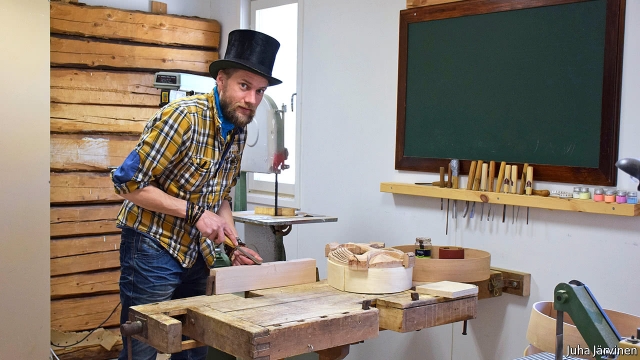 Juha Jarvinen, an unemployed young father from a village near Yurva in western Finland. For six years he wanted to start a business, but he could not, because then he would be deprived of unemployment benefits - and there was nothing for the children to buy food for. Thanks to the AML, such an opportunity appeared: now he has registered a video production company, and also agreed to paint the roofs on the houses of two neighbors. Photo: Juha Jarvinen
Juha Jarvinen, an unemployed young father from a village near Yurva in western Finland. For six years he wanted to start a business, but he could not, because then he would be deprived of unemployment benefits - and there was nothing for the children to buy food for. Thanks to the AML, such an opportunity appeared: now he has registered a video production company, and also agreed to paint the roofs on the houses of two neighbors. Photo: Juha JarvinenIn January 2017,
the first two-year experiment in the European Union on the payment of unconditional basic income (AML)
began in Finland. The authorities randomly selected 2,000 unemployed citizens between the ages of 25 and 58.
Without asking their wishes , citizens began to be charged monthly on € 560 of unconditional income. Accruals continued regardless of other sources of income. That is, regardless of whether a person finds a job or not.
The two-year experiment should test the hypothesis that the AML stimulates people to better find a job or start their own business than unemployment benefits. According to the hypothesis, people receiving unemployment benefits are afraid to start a business, because benefits are enough for life - and in the case of employment, they lose this benefit. Business can go bankrupt. Accordingly, if the allowance is enough for life (in accordance with the principles of humanism, it
should be enough for life so that a person does not die of starvation), then employment does not give so many social benefits, and it is risky to open an IP. Another thing - AML. Unlike unemployment benefits, payments are saved here after a person has opened an IP, so that he runs no risk.
High unemployment is a problem for the Finnish economy. In 2015, unemployment reached 10% - the maximum level in the last 17 years. Accordingly, the authorities decided to experiment with an unconditional basic income in the hope of reducing unemployment.
The experiment was originally designed for two years: 2017 and 2018. It was assumed that at the beginning of the second year it would expand. From 2018, the developers planned to pay the AML not only to the unemployed, but also to working people. However, lawmakers changed the terms of the program - to the dismay of researchers. New conditions significantly reduce the value of scientific results that scientists were going to get.
In December 2017, the Finnish Parliament
passed a law that requires job seekers to work for at least 18 hours over a period of three months, otherwise they will not receive an AML. According to researchers, this is completely contrary to the principle of unconditional basic income, because it makes it dependent on the availability of work. Now the results of the program will be questioned. “Right now, the government is making changes that alienate the system from the basic basic income,” said Miska Simanainen, a researcher at the Kesa Social Security Fund, in a
comment to the Swedish newspaper Svenska Dagbladet .
The results of the experiment will be summed up next year, but we can already say that it was not carried out quite “cleanly”, so it will be difficult to draw any concrete conclusions on it. According to preliminary results, participants in the program recorded a decrease in stress levels soon after the start of payments. But the researchers emphasize that the short duration of the program does not allow to draw final conclusions about the effects of AML. The Social Protection Fund will monitor the Finns who participated in the AML program over the next ten years - then you can try to determine the long-term consequences of the payments.
According to public opinion polls, 70% of Finns
support the idea of basic income , but this number drops to 35% when respondents are told that the program is funded from the budget and will have to increase income tax for it.
Studies of basic basic income are continuing in several countries, but so far do not provide unambiguous results. The idea itself is supported by many scientists and businessmen, including those from Silicon Valley: from Ilona Mask to Mark Zuckerberg, and the founder of the Y Combinator start-up incubator Sam Altman even
pays out to the local people the AML from his own pocket in a private experiment. Such a distribution of finances from the rich to the poor will help in the struggle against the acute problem of the modern world - the growing gap between the richest and the poorest. Now it has come to the fact that 1% of the richest citizens control
50.8% of world wealth , and this share continues to grow, and half of the poorest people own in aggregate only 1% of world wealth.
For example, if a hundred Russian billionaires donate at least 10% of their wealth per year to social benefits, then representatives of the poorest tithing of the population can receive benefits of about $ 100 per month. In theory, the system should now work in this way through taxes on profits and property - and their distribution through social benefits.
According
to futurologist Ray Kurzweil, by the 2030s around the world will inevitably begin to pay the BOD in terms of the overall automation of labor.